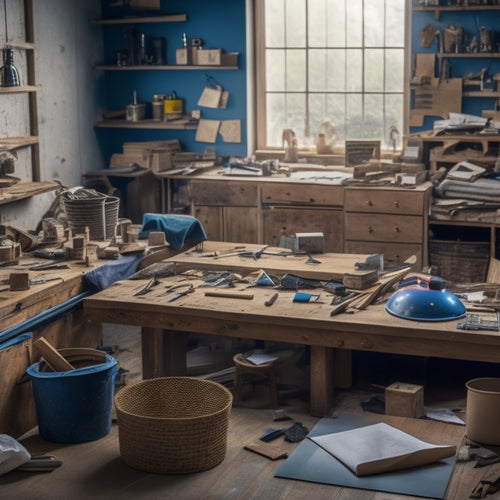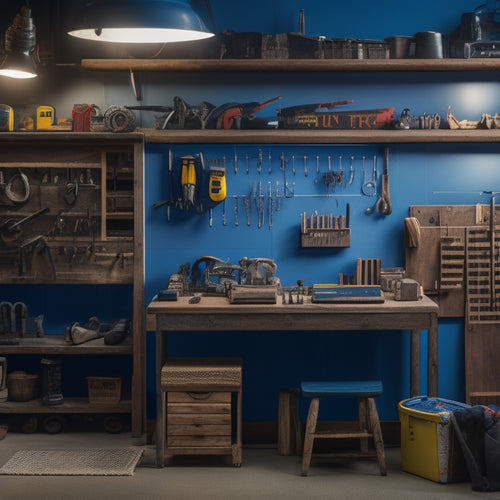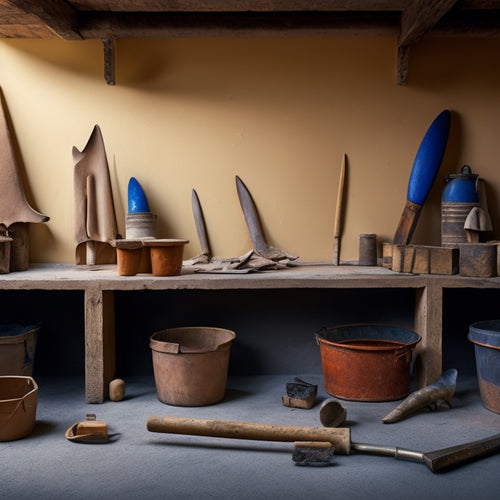
Why Buy the Right Leveling Tools for Renovation
Share
When it comes to renovation, buying the right leveling tools is essential to achieving accurate and precise results. You need to take into account the type of renovation, surface material, and desired level of precision to select the most suitable tools for the job. With various types of leveling tools available, such as laser levels, spirit levels, and digital levels, you must understand their specific applications and benefits. By investing in the right tools and techniques, you can guarantee structural integrity, minimize risks, and achieve long-lasting renovation results. Now, let's dive deeper into the world of leveling tools and explore the specifics that can make all the difference in your project.
Key Takeaways
• Accurate leveling ensures structural integrity, appearance, and load-bearing capacity of block walls, preventing costly rework and safety hazards.
• The right leveling tools provide precision measurements, saving time and effort, and guaranteeing long-lasting renovation results.
• High-quality leveling tools withstand heavy use, reduce fatigue, and improve productivity, making them a worthwhile investment for renovation projects.
• Selecting the correct type of leveling tool, such as laser levels or spirit levels, depends on the renovation type, surface material, and desired level of precision.
• Investing in proper leveling tools and techniques avoids costly mistakes, ensures compliance with industry standards, and builds confidence for successful project completion.
Understanding Leveling Tool Requirements
When planning a renovation project, you need to determine the specific leveling tool requirements to guarantee accurate and efficient results. This involves considering the type of renovation, the surface material, and the desired level of precision.
You must also assess your own skill level and the number of people involved in the project.
In today's digital age, tool technology has advanced considerably, offering a range of leveling tools that cater to different user experiences.
For instance, laser leveling tools provide high-precision results and are ideal for large-scale projects. On the other hand, spirit levels are more suitable for smaller tasks and offer a more traditional approach.
Types of Leveling Tools Needed
You'll need to choose from a range of leveling tools, including laser levels, spirit levels, and digital levels, depending on the specific requirements of your renovation project.
Laser levels are ideal for large-scale projects and provide precise, long-distance measurements. Spirit levels, also known as bubble levels, are perfect for smaller tasks and offer simple, accurate readings. Digital levels, on the other hand, provide precise digital readings and are often used for more complex projects.
In addition to these, you may also need self-leveling tools, which automatically adjust to the surface they're on, and manual levels, which require you to manually adjust them. Each type of leveling tool has its unique features and benefits, and selecting the right one will guarantee your renovation project is completed accurately and efficiently.
When choosing a leveling tool, consider the size and complexity of your project, as well as your personal preferences and skill level. By selecting the right tool for the job, you'll be able to achieve professional-looking results and avoid costly mistakes.
With the right leveling tool, you'll be well on your way to a successful renovation project.
Block Wall Repair Challenges
Repairing block walls can be a challenging task, especially when dealing with structural damage, crumbling mortar, and uneven surfaces. These issues require careful assessment and strategic planning to overcome. As you tackle this project, you'll need to take into account the impact of your repairs on both the block wall aesthetics and structural integrity.
Here are some common challenges you may face:
-
Assessing damage: Identifying the root cause of the damage and determining the extent of the repairs needed.
-
Matching materials: Finding matching blocks, mortar, and other materials to guarantee a seamless repair that blends with the existing structure.
-
Maintaining structural integrity: Making sure that the repairs don't compromise the structural integrity of the wall, which can be critical in load-bearing situations.
- Achieving a uniform finish: Getting a uniform finish that blends with the surrounding area, which can be time-consuming and require specialized skills.
Importance of Precision Leveling
To guarantee a successful block wall repair, precise leveling is essential, as it directly affects the structural integrity and overall appearance of the renovated wall. You can't afford to compromise on leveling standards, as even minor deviations can lead to disastrous consequences.
When you employ precision techniques, you ascertain that each block is perfectly aligned, minimizing the risk of cracks, shifting, and collapse.
Precision leveling is critical in maintaining the wall's load-bearing capacity, durability, and aesthetic appeal. It's not just about getting the job done; it's about doing it right.
Leveling inaccuracies can lead to costly rework, damage to surrounding structures, and even safety hazards. By investing in the right leveling tools and mastering precision techniques, you can confidently tackle complex renovation projects, knowing that your work will stand the test of time.
Measuring Accuracy and Reliability
When it comes to measuring accuracy and reliability, your ability to take precise readings is only as good as the tools you're using. Inaccurate readings can lead to costly mistakes, wasted time, and compromised structural integrity. With the right leveling tools, you can guarantee that your measurements are accurate and reliable, giving you the confidence to move forward with your renovation project.
To achieve precise readings, consider the following:
-
Calibration: Verify your leveling tools are calibrated to industry standards to guarantee accurate measurements.
-
Measuring techniques: Develop a solid understanding of various measuring techniques, such as spirit leveling and electronic leveling, to choose the best approach for your project.
-
Accuracy standards: Familiarize yourself with industry-recognized accuracy standards, such as those set by the International Organization for Standardization (ISO), to guarantee your measurements meet the required thresholds.
- Tool maintenance: Regularly maintain and clean your leveling tools to prevent errors caused by worn or damaged components.
Leveling Tool Material and Build
When selecting a leveling tool, you'll want to take into account the material and build that will best suit your renovation needs.
You're looking for a tool that's both durable and strong, able to withstand the rigors of daily use on the job site.
The weight and balance of the tool are also essential factors, as they'll directly impact your comfort and precision while working.
Durability and Strength
You can rely on a leveling tool's durability and strength, which directly correlates with the quality of its material and build. A well-built leveling tool guarantees material longevity and structural integrity, allowing you to focus on the renovation task at hand.
Here are four key factors to take into account when evaluating a leveling tool's durability and strength:
-
Material selection: Look for tools made from high-quality, corrosion-resistant materials that can withstand harsh job site conditions.
-
Structural design: A sturdy, ergonomic design guarantees the tool can handle heavy loads and frequent use without compromising its accuracy.
-
Component quality: Durable components, such as precision-crafted gears and bearings, guarantee smooth operation and minimize wear and tear.
- Manufacturing process: A reputable manufacturer with a rigorous quality control process assures a tool that can withstand the demands of renovation work.
Tool Weight and Balance
In a leveling tool, ideal weight and balance are critical, as they directly impact its ease of use, accuracy, and overall performance during renovation tasks.
When you're working with a tool that's too heavy or unbalanced, you'll quickly become fatigued, leading to mistakes and decreased productivity. On the other hand, a tool that's ergonomically designed to fit comfortably in your hand will reduce strain and allow you to work for longer periods without discomfort.
You'll appreciate a tool that's built with user comfort in mind, featuring contoured grips and balanced weight distribution. This thoughtful design enables you to focus on the task at hand, rather than struggling with the tool itself.
Look for leveling tools made from high-quality materials that provide strength without sacrificing ergonomics. A well-balanced tool will also improve its accuracy, as you'll be able to maintain a steady hand and make precise adjustments.
Considering Tool Weight and Size
Tool weight and size considerably impact your productivity and comfort during renovation projects, making it essential to choose leveling tools that balance functionality with portability. You don't want to be lugging around heavy equipment all day, but you also need tools that can handle the job.
When selecting leveling tools, consider the following factors:
-
Ergonomic design: Look for tools with contoured grips and balanced weight distribution to reduce fatigue and discomfort.
-
Compact size: Choose tools that are compact and lightweight, making them easy to maneuver in tight spaces.
-
Durable materials: Select tools made from durable, high-quality materials that can withstand heavy use without adding excess weight.
- Adjustable features: Opt for tools with adjustable features, such as telescoping handles or pivoting heads, to enhance user convenience and versatility.
Budgeting for Leveling Tools
Having selected the right leveling tools based on weight, size, and ergonomics, it's now important to determine how much to invest in these tools.
You need to set a budget that balances your needs with the cost of the tools. Consider the cost-effective options that meet your essential features requirements. Don't compromise on quality, but prioritize your needs to allocate your budget wisely.
When budgeting, consider the frequency of use, durability, and maintenance costs. High-quality tools may be more expensive upfront, but they'll save you money in the long run.
Calculate the total cost of ownership, including replacement parts, batteries, and calibration costs. You may need to allocate a larger budget for high-end tools, but they'll provide accuracy and precision, ensuring your renovation project meets the desired standards.
Ensuring Tool Compatibility and Versatility
When selecting leveling tools for your renovation project, you're not just buying a single device - you're investing in a system.
You'll want to guarantee that your tools can work seamlessly together, swapping out components and accessories as needed.
Tool Interchangeability Matters
Your renovation project's efficiency hinges on the ability to switch between tasks seamlessly, which is why you need a lineup of tools that can adapt to different applications without breaking stride. Tool interchangeability matters, as it allows you to tackle various tasks with minimal downtime and maximum productivity.
When selecting tools, consider the following key factors:
-
Compatibility: Validate tools from different brands can work together seamlessly, eliminating the need for redundant purchases.
-
Modular design: Opt for tools with interchangeable batteries, chargers, or accessories to reduce clutter and increase versatility.
-
Accessory compatibility: Choose tools with a wide range of compatible accessories, such as drill bits or saw blades, to tackle diverse tasks.
- User reviews and ratings: Research tool brands and read user reviews to gauge their performance, durability, and adaptability in real-world scenarios.
Multiple Task Capabilities
You can maximize your renovation project's efficiency by selecting tools that offer multiple task capabilities, allowing you to tackle a wide range of tasks with a single tool or platform. This versatility enables you to streamline your workflow, reducing the need for multiple tools and minimizing downtime.
With multi-purpose applications, you can switch between tasks seamlessly, ensuring task efficiency and accelerating project completion.
When evaluating tools, look for those that can adapt to different tasks, such as leveling, alignment, and measurement. A single tool that can perform multiple functions can considerably reduce your overall investment in tools and equipment.
Additionally, consider tools with adjustable features, allowing you to customize the tool to suit specific tasks. By selecting tools with multiple task capabilities, you'll be able to tackle complex projects with confidence, knowing you have the right tools for the job.
Frequently Asked Questions
Can I Use a Single Leveling Tool for All Renovation Projects?
You're wondering if a single leveling tool can handle all your renovation projects.
While it's tempting to opt for versatility, the truth is, each project has specific needs.
A single tool mightn't provide the precision and accuracy required for every task.
You'll likely need a range of tools to tackle different aspects of your project, ensuring you get the desired results.
How Do I Calibrate My Leveling Tool for Precise Measurements?
Get ready to level up your renovation game!
To calibrate your leveling tool for precise measurements, you'll need to master various calibration techniques.
Familiarize yourself with the specific requirements for your tool type - whether it's a spirit level, laser level, or inclinometer.
Follow the manufacturer's instructions and take the time to fine-tune your tool.
With a little practice, you'll be pinpointing perfect levels in no time, ensuring your renovation projects are nothing short of perfection.
Are Digital Leveling Tools More Accurate Than Traditional Ones?
You're wondering if digital leveling tools are more accurate than traditional ones. The answer is, it depends on your needs.
Digital tools offer superior digital accuracy, especially in complex projects, but traditional tools provide tried-and-true traditional reliability.
If you need precise measurements and advanced features, digital is the way to go. However, if simplicity and ruggedness are your priorities, traditional tools still deliver.
You decide what matters most for your renovation project.
Can I Rent Leveling Tools Instead of Buying Them?
You're considering renting leveling tools instead of buying them. That's a smart move, especially if you're on a tight budget.
Let's do a cost comparison: rental fees can add up quickly, especially for long-term projects.
While rental benefits include avoiding storage and maintenance, the overall expense mightn't be justified.
Weigh the costs and assess your needs before making a decision.
How Often Should I Replace My Leveling Tools for Optimal Performance?
Coincidentally, you're wondering about replacing your leveling tools just as you're about to tackle a major renovation project.
To guarantee peak performance, you should replace them when you notice performance indicators like worn-out vials, fuzzy sights, or inaccurate readings.
Typically, high-quality leveling tools last around 5-7 years with proper maintenance.
However, if you're using them extensively, you might need to replace them every 2-3 years to maintain accuracy and precision.
Conclusion
You've survived the renovation chaos, but without the right leveling tools, your masterpiece could be a tilting tower of doom.
It's ironic that something as essential as leveling is often overlooked, yet it's the difference between a sturdy structure and a wobbly mess.
By investing in the right tools, you'll guarantee your renovation is a work of art, not a hot mess.
So, don't skimp on leveling tools – your structure's stability depends on it.
Related Posts
-

7 Best Home Renovation Project Checklists With Timelines
You're about to initiate a home renovation project, and establishing a clear plan with timelines is vital to staying ...
-

7 Smart Tool Organization Tips for Small Renovations
As you tackle your small renovation, you're likely wasting precious time searching for misplaced tools. To enhance ef...
-

7 Best Plastering Bat Sizes for DIY Renovations
When tackling DIY renovations, you'll want to choose the right plastering bat size to achieve a professional-looking ...


